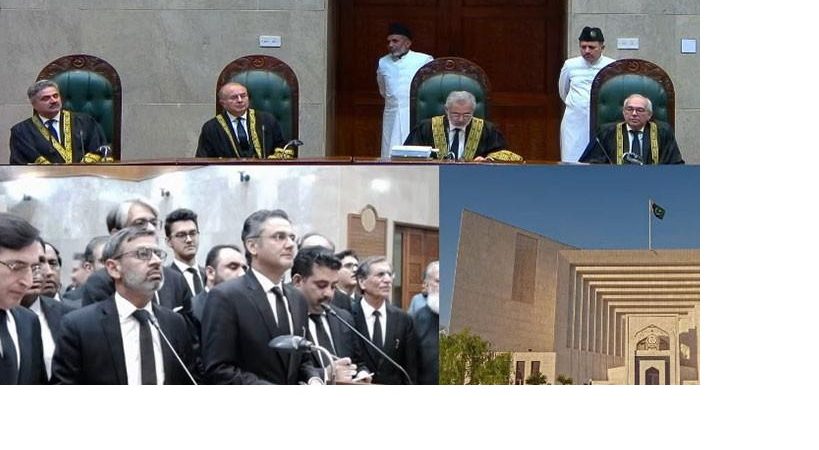In major legal victory for PTI, Supreme Court declares party eligible for reserved seats

ISLAMABAD: In a major legal victory for the Pakistan Tehreek-e-Insaf (PTI), the Supreme Court on Friday ruled that the party is eligible for the allocation of reserved seats.
Justice Mansoor Ali Shah announced the 8-5 majority verdict, nullifying the Peshawar High Court’s (PHC) order wherein it had upheld the Election Commission of Pakistan’s (ECP) decision denying the reserved seats to the SIC.
The verdict was supported by Justices Athar Minallah, Shahid Waheed, Muneeb Akhtar, Muhammad Ali Mazhar Ayesha Malik, Syed Hassan Azhar Rizvi, and Irfan Saadat Khan.
The PTI candidates did not contest the polls on a single symbol, forcing them to join hands with the Sunni Ittehad Council (SIC), but that could not get the party the reserved seats as the ECP ruled against them.
In its decision today, the court declared that the lack or denial of an election symbol does not in any manner affect the Constitutional or legal rights of a political party to participate in an election, whether general or by, and to field candidates and that the commission is under a Constitutional duty to apply all statutory provisions accordingly.
Some jurists, during the proceedings, had noted that the apex court had not ruled that the PTI could not participate in the general elections as a political party, and that the commission had misinterpreted the top court’s verdict.
“PTI was and is a political party, which secured general seats in the national and provincial assemblies in the general elections of 2024,” read the verdict.
According to the verdict, the PHC’s judgment dated March 25 is set aside. “The order of the ECP dated March 1 is declared to be ultra vires to the Constitution, without lawful authority, and of no legal effect,” it said.
The top court remarked that PTI, as a political party, has a legal and constitutional right to reserved seats.
Rejecting the appeals filed by the SIC, the apex court said that the party cannot take reserved seats as per the Constitution.
The ruling said that the PTI should present a list of eligible candidates for the reserved seats to the electoral body within 15 days after the verdict.
It added that the ECP should then publish the list of reserved seats of the candidates on its website within seven days.
“The seats allocated to the PTI after this stage will be considered as their seats. [Once the PTI gets its seats in parliament], it will be eligible for the reserved seats,” said the ruling.
The full bench, led by Chief Justice of Pakistan (CJP) Qazi Faez Isa, also comprises Justice Syed Mansoor Ali Shah, Justice Akhtar, Justice Yahya Afridi, Justice Amin-ud-Din Khan, Justice Jamal Khan Mandokhail, Justice Mazhar, Justice Minallah, Justice Syed Rizvi, Justice Malik, Justice Waheed, Justice Saadat, and Justice Naeem Akhtar Afghan.
A timeline of reserved seats saga
The reserved seats issue first emerged after over 80 Pakistan Tehreek-e-Insaf (PTI) backed independent candidates emerged victorious in the February 8 elections and subsequently joined the SIC in a bid to claim seats reserved for minorities and women.
The SIC then approached the ECP on February 21 seeking allocation of reserved seats. However, the PTI suffered a setback after the electoral body, citing the party’s failure to submit its list of candidates, denied allocating the reserved seats to the SIC via its 4-1 majority verdict on March 4.
In the verdict, the ECP said it extended the deadline to submit a priority list for the reserved seats of women, and the SIC, before the February 8 polls, did not submit the required list which was “mandatory”.
The electoral body’s verdict cited Article 51(6), saying the article clearly stated the reserved seats would be allocated to the political parties who contested elections and won general seats based on a “proportional representation system”.
While rejecting the plea of SIC, the ECP accepted applications of the opposing parties and decided that the seats in the National Assembly would not remain vacant and be allocated by a proportional representation process of political parties on the basis of seats won by political parties.
Related News

Pakistan, Bangladesh resolve to bolster ties in various sectors
ISLAMABAD, JAN 25: Pakistan and Bangladesh have expressed their resolve to further strengthen ties acrossRead More

Zhao Shiren lauds Mohsin Naqvi’s role in Pakistan-China friendship
LAHORE, JAN 25 /DNA/ – Federal Interior Minister and Chairman Pakistan Cricket Board, Mohsin Naqvi,Read More


Comments are Closed